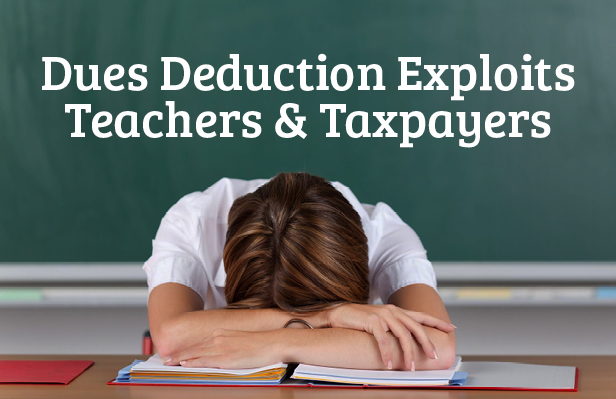Commentary

Unions’ Taxpayer-Subsidized Politics
Note: This commentary first appeared in The Philadelphia Inquirer. Another version was also published in the Pittsburgh Tribune Review.
How would you feel if you were forced to pay for a political cause that worked against your own beliefs and values? Outraged? Victimized? Just plain angry?
Many Pennsylvania teachers, including some in the Philadelphia area, are no different, and they’ve started speaking out about an injustice that should infuriate every taxpayer.
That injustice is Pennsylvania’s practice of forcing teachers to fund union political activity via automatic dues deduction – an exploitative system enabled by you, the taxpayer. School districts, along with state government and municipalities, collect union dues, fees, and political money by deducting them from workers’ paychecks before they ever see the money, just like taxes.
Donna Gordon, a teacher in Chester County’s Avon Grove School District, isn’t happy with being forced to fund the Pennsylvania State Education Association (PSEA), the largest school employees’ union in the state. “I just politically don’t agree and don’t feel that’s something I should have to be supporting,” she told the Commonwealth Foundation. “I feel very much like my own personal rights have been invaded and I am very upset about that.”
While teachers, state workers, and other government employees can opt out of paying full union dues, incredibly, many are still required to pay “fair share” fees to unions just to keep their jobs. Gordon and other teachers from across the commonwealth have joined together to protest and to make the public aware that taxpayers are helping to fund blatantly political activity.
Case in point: The PSEA reported spending $3.2 million of workers’ dues on political activity and lobbying last year alone. Its political action committee donated an additional $2 million directly to candidates.
Robin Fought, who also teaches in the Avon Grove district, was shocked to discover a political funding system that has flown under the radar for decades: “To my surprise, our school district resources, as well as my tax money, are being used to deduct not only union dues, but political action committee funds for PSEA-PACE that go to candidates that I do not support,” she told the foundation.
Polling conducted this summer shows nearly 80 percent of Pennsylvania voters agree that unions should not be able to use taxpayer resources to collect their members’ dues. Even 75 percent of union members supported requiring unions to collect their political money directly from members.
The PSEA is the largest of Pennsylvania’s government unions, but it’s far from the only one. An alphabet soup of public-sector unions – the American Federation of State, County, and Municipal Employees (AFSCME), Service Employees International Union (SEIU), United Food and Commercial Workers (UFCW), and Pennsylvania Federation of Teachers (PFT) – spent a total of $1.6 million on lobbying last year, and an additional $2 million in PAC contributions.
You’ve probably seen some of these government unions’ political ads, purchased with funds collected with taxpayer resources.
Earlier this year, UFCW Local 1776 spent more than $1 million on TV and radio ads fighting liquor privatization. The most ridiculous example showed a young girl at her father’s funeral, claiming privatization would result in more drunken-driving deaths – a claim debunked and ridiculed by numerous sources, including Philadelphia City Paper.
Union leaders representing government liquor store managers even lobbied against transportation funding to try to thwart liquor privatization this spring.
In the heat of the Philadelphia school funding crisis, the Philadelphia Federation of Teachers ran attack ads against Mayor Nutter and Gov. Corbett. The ads repeated inaccurate information about supposed education spending cuts. Union leaders haven’t said how much they spent on these ads, other than calling the investment “substantial.”
While workers certainly have the right to organize and join a union of their own free choice, no one should be forced to fund union political activity with which he disagrees. What’s more, no taxpayer resources should be used to support partisan political activity.
It’s time to end the forced collection of political money and protect the rights of Pennsylvania’s teachers, workers, and taxpayers to use their hard-earned income for the causes they believe in – not those dictated by union leaders.
# # #
Nathan A. Benefield is director of policy analysis at the Commonwealth Foundation
(CommonwealthFoundation.org), Pennsylvania’s free market think tank.